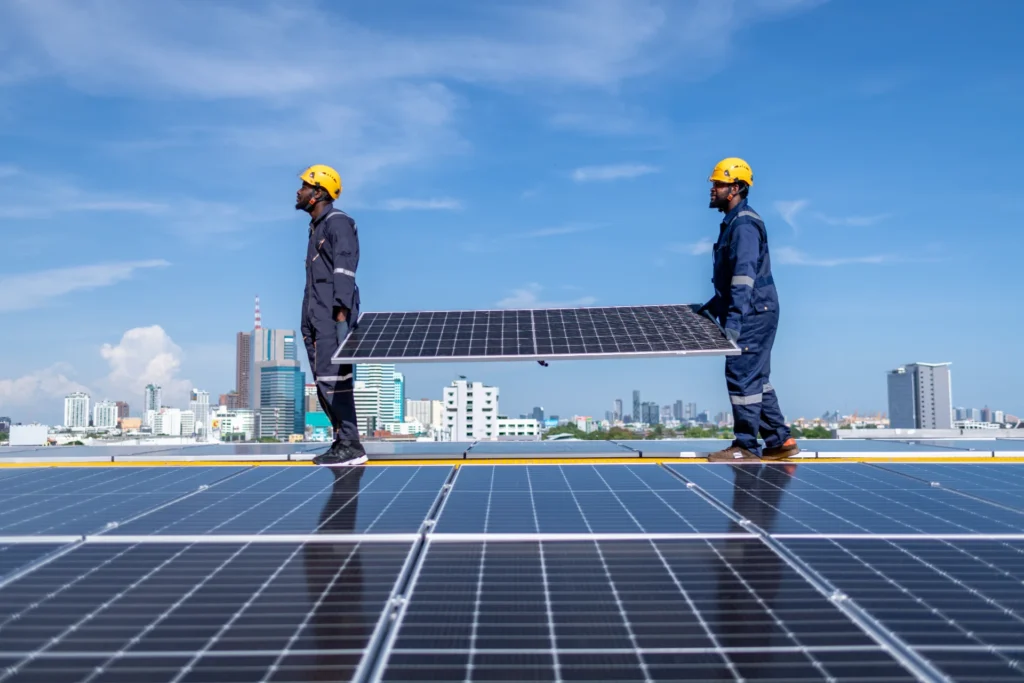
Solar energy has become increasingly popular in recent years, offering an environmentally-friendly, cost-effective solution for powering homes. However, investing in a residential solar system is not without its challenges. Many homeowners make common mistakes when acquiring a solar panel system that can lead to inefficiencies and higher costs.
This article will explore homeowners’ most common mistakes when getting a residential solar system. By becoming aware of these errors, prospective solar panel buyers can avoid them and ensure they get the most value from their investment. Whether you want to reduce your carbon footprint or save money on your electricity bills, this article will provide valuable information to help you decide about purchasing a residential solar system.
An objective assessment of energy needs is a critical first step in acquiring a residential solar system, as it ensures that the system’s capacity aligns with the household’s electricity consumption patterns. Homeowners must consider multiple factors when assessing their energy needs, such as estimating energy consumption and solar affordability. By doing so, homeowners can make informed decisions about their solar systems and avoid common mistakes.
When estimating energy consumption, homeowners should carefully examine their electricity bills to determine their average daily usage. This information helps them determine how much solar power they need daily. Additionally, homeowners should consider any future changes in their energy usage patterns, such as purchasing an electric vehicle or adding new appliances to the home. These changes can impact their energy consumption and require additional solar panels or battery storage.
Assessing solar affordability involves considering both upfront costs and long-term savings. Installing a residential solar system can be expensive; however, it is important to remember that this investment pays off over time through reduced electricity bills and potential tax credits or incentives. Homeowners should also factor in maintenance costs for the system and any financing options available.
Accurately assessing your energy needs is crucial when getting a residential solar system. Estimating your energy consumption and assessing solar affordability are key components of this process that cannot be overlooked. By considering these steps early in the decision-making process, homeowners can avoid costly mistakes and enjoy the benefits of clean, renewable energy for years to come.
The appropriate solar panel system is crucial for effective solar power utilization at home. The most common mistake when choosing a residential solar panel system is not considering the installation process and maintenance requirements. Choosing a system that meets your energy needs is important, but it is equally important to consider how easy or difficult it will be to install and maintain the system over time.
When selecting a solar panel system, homeowners must carefully evaluate their installation options. Some systems are designed for rooftop installations, while others must be ground-mounted. Rooftop installations are often easier because they require less space and do not require any additional construction work. Ground-mounted systems may require permits and additional costs for installation, which can add up quickly.
Another key factor in selecting a residential solar panel system is maintenance requirements. Solar panels generally require little maintenance beyond occasional cleaning and inspection of connections, but some systems may require more frequent attention than others. Homeowners should consider the expected lifespan of their chosen system and any warranties or repair guarantees offered by the manufacturer.
Choosing the right solar panel system requires careful consideration of energy needs and practical concerns such as installation process and maintenance requirements. By evaluating options based on these factors, homeowners can select a reliable and cost-effective solution for their home’s energy needs that provide long-term benefits in terms of savings on utility bills and reduced environmental impact.
One important aspect of implementing a solar power system in your home is finding a reputable and reliable installer. This can be overwhelming, as many companies offer solar installation services. Choosing an experienced and licensed installer with the necessary skills and knowledge to install your solar panels correctly is crucial.
When looking for a reputable installer, it is essential to consider their credentials. A qualified solar panel installer should be certified by accredited programs such as the North American Board of Certified Energy Practitioners (NABCEP). This certification ensures the installer has undergone rigorous training in designing and installing solar systems.
Another factor to consider when selecting an installer is their reviews. Customer feedback provides valuable insight into the quality of services a particular company offers. Reviewing previous customer reviews can help determine if the company delivers on its promises, provides excellent customer service, and completes projects within budget and on time.
Ultimately, finding a reputable solar panel installer is essential for ensuring that your investment in renewable energy pays off in the long run. By doing your research beforehand, you can avoid common mistakes and work with a professional who will guide you through every process step – from initial consultation to final installation – while staying within budget constraints. With expert guidance from a trustworthy provider, homeowners can feel confident they are making an informed decision about switching to renewable energy sources like solar panels.
Maintaining a residential solar system is crucial for its optimal performance and longevity. This entails inspecting your system regularly to identify any signs of wear and tear, cleaning your solar panels to remove dirt, debris, or bird droppings that could affect their efficiency, and monitoring your energy production to detect any unusual patterns or changes. Neglecting these maintenance practices can compromise the effectiveness of your investment in solar energy and lead to costly repairs in the long run.
Regular inspection of a residential solar system is crucial to ensure its efficiency and longevity, as it allows for early detection of potential issues that could lead to costly repairs. Here are some important points to consider when inspecting your solar system:
By following these guidelines and conducting regular inspections at recommended frequencies (typically every six months), you can identify any issues before they become major problems that require expensive repairs or replacements.
Ensuring solar panels’ optimal performance and longevity requires periodic cleaning to remove accumulated dirt and dust. Maximizing efficiency is crucial as any obstruction on the surface of the panels can decrease their ability to absorb sunlight, ultimately reducing energy production. Seasonal cleaning is recommended for areas with high pollution or dust levels, while regions with less debris may require less frequent maintenance.
Cleaning solar panels should only be performed by professionals using specialized tools and techniques to avoid damaging the surface. Most manufacturers provide instructions on cleaning their products, ensuring users follow these guidelines for safe and effective results. Additionally, turning off the system before starting any cleaning process is important, as live wires could cause harm during this stage. Overall, regular cleaning is essential to maintaining a residential solar system and can help maximize its efficiency over time.
Monitoring energy production is an important aspect of owning a solar panel system, as it allows homeowners to track their system’s efficiency and identify any potential issues. By monitoring the amount of electricity generated by the solar panels daily or weekly, homeowners can ensure that their system performs optimally. If there are any discrepancies in energy production, such as a sudden drop in output, it could indicate a problem with one or more panels. Addressing these issues promptly will help maximize efficiency and optimize performance.
In addition to identifying problems early on, monitoring energy production helps homeowners track their savings. By comparing the electricity generated by their solar panels to their utility bills, homeowners can calculate how much money they save each month. This information can be used to adjust usage habits and further increase savings. Regular monitoring will benefit the homeowner and provide valuable data for professionals who may need to service or repair the system over time. Overall, consistent monitoring is critical for maintaining optimal performance and maximizing savings from residential solar systems.
When installing a residential solar system, it is crucial to adhere to local regulations and obtain necessary permits and approvals. Failure to do so can result in fines and even forced system removal. Meeting electrical and safety codes is also essential to ensure the safety of individuals and properties surrounding the installation site. Therefore, it is imperative for homeowners considering solar installations to thoroughly research their local regulations before proceeding with any installations.
Familiarizing oneself with the specific solar regulations in the locality is imperative to successfully installing a residential solar system. Understanding solar policies and navigating local regulations can be challenging, but ensuring that your project complies with all relevant codes and standards is crucial. Failure to do so may result in costly fines, delays, or even dismantling an improperly installed system.
To help homeowners navigate local solar regulations, here are some common examples of requirements that may vary by jurisdiction:
Requirement | Explanation |
|
|
Net metering | This policy specifies how excess energy generated by your panels will be credited to your utility bill. |
Building permits | Most jurisdictions require permits for home improvement projects, including solar installations. |
Setbacks and height restrictions | These rules define how far from property lines or structures panels must be placed and how tall they can be. |
Historic district guidelines | Additional approval may be required before installing panels if you live in a designated historic district. |
By understanding these requirements and working closely with local authorities and experienced professionals, homeowners can successfully install their residential solar systems while avoiding potential legal issues or safety hazards.
Obtaining necessary permits and approvals from local authorities is crucial in ensuring that your solar installation project complies with legal requirements and safety standards. Streamlining the permit process can help you avoid delays in the project timeline. Each state or municipality has its own set of rules and regulations regarding solar installations, so it is important to research and understand them before starting the installation process.
When applying for permits, ensure all necessary documents and information are ready, such as site plans, electrical diagrams, and equipment specifications. Plan for inspections throughout the installation process to ensure compliance with building codes and safety standards. Failure to obtain proper permits or comply with regulations can result in fines or even removal of the solar system. By taking these steps seriously, you can ensure a smooth installation process while complying with legal requirements and keeping your home safe.
Achieving compliance with electrical and safety codes is vital to ensure a solar installation’s safe and effective operation. The National Electrical Code (NEC) sets wiring, grounding, and equipment installation standards promoting electrical safety. State building codes may also require permits, inspections, and approvals before installing solar panels. Hiring licensed electricians knowledgeable in solar technology and local regulations can help ensure the system meets all requirements.
Electrical safety is especially important in solar installations because solar panels generate direct current (DC) electricity which must be converted to alternating current (AC) for home use. This requires inverters which need to be safely installed by licensed electricians to prevent electrical hazards such as fires or electrocution. In addition, some municipalities have additional requirements for rooftop installations, such as wind uplift resistance ratings or clearance from roof edges. Ensuring that all these requirements are met through proper inspections will provide peace of mind for homeowners and allow them to enjoy their newly installed residential solar systems without any issues.
One important aspect often overlooked when installing a residential solar system is the consideration of energy storage options. Energy storage benefits are numerous, including maximizing savings and optimizing energy usage with storage solutions. Choosing battery options for residential solar systems can be complex, but it is worth investing time in researching different types of batteries to determine which one best suits individual needs.
When choosing a battery option for a residential solar system, several factors must be considered. The first factor is capacity, which refers to the amount of electricity stored in the battery. A larger battery will provide more backup power during outages and let homeowners store more excess energy generated by their solar panels. Another important factor is cycle life, which refers to how often the battery can be charged and discharged before its capacity degrade significantly.
In addition to these technical considerations, it’s also essential to consider how an energy storage solution fits into daily life. Homeowners should consider their typical energy usage patterns and decide whether they need a battery that provides backup power during outages or allows them to maximize the self-consumption of solar-generated electricity.
Not considering energy storage options when installing a residential solar system can lead to missed opportunities for greater savings and increased efficiency. By researching different types of batteries and considering personal lifestyle needs alongside technical specifications such as capacity and cycle life, homeowners can find an optimal solution for their unique situation. Incorporating an effective energy storage solution into a residential solar system increases independence from traditional grid-based electricity sources while reducing carbon footprint – providing freedom on multiple levels!
Battery Type | Pros | Cons |
Lead-acid | Affordable | Shorter lifespan than other types |
Lithium-ion | High efficiency & long lifespan | Expensive initial cost |
Flow Batteries | Scalable & long lifespan | Large size & expensive installation costs |
When considering a residential solar system, it is important not to overlook the incentives and rebates that may be available. One such incentive is the federal tax credit, which can provide up to 26% of the total cost of installation. State tax credits may also be available, depending on the location. Additionally, many local utilities offer incentives for installing solar panels, such as cash rebates or net metering programs. Finally, financing options like loans or leases can make solar more affordable for homeowners.
The availability of federal and state tax credits is crucial when installing a residential solar system, as it can significantly reduce the upfront cost and provide long-term savings. The federal government provides a tax credit for 26% of the total cost of a residential solar system, which can amount to thousands of dollars in savings. Additionally, many states offer their tax incentives or rebates that can further reduce the cost.
To qualify for these tax credits, certain criteria must be met. For example, the solar panels must be installed on a primary or secondary residence and not used solely for business purposes. The claiming process also varies depending on whether you are claiming federal or state tax credits and may require additional documentation, such as proof of installation and receipts for equipment purchases. However, with careful research and planning, taking advantage of these tax incentives can make investing in a residential solar system more affordable and financially beneficial in the long run.
Local utility incentives are another important consideration for homeowners interested in installing solar panels. These incentives vary depending on the state and local utility company but can include cash rebates, net metering programs, and performance-based incentives. Maximizing savings through these programs requires careful research and understanding eligibility requirements.
Cash rebates are a common incentive utilities offer to offset the initial cost of installing solar panels. Net metering programs allow homeowners to receive credits for excess energy produced by their system that is sent back into the grid, which can significantly reduce electric bills. Performance-based incentives provide payments based on the energy a system generates over time. To be eligible for these incentives, homeowners must meet certain criteria, such as having an approved solar installer or meeting specific equipment standards. Understanding these requirements and researching available incentive programs is crucial for maximizing savings when investing in a residential solar system.
Continuing with our discussion on local utility incentives, let’s move to the next important aspect of getting a residential solar system – financing options. Evaluating different financing options before investing in a solar panel system is essential. This can help you save money and avoid common mistakes that people often make when purchasing a solar panel system.
There are primarily two types of financing options available for residential solar systems: lease and loan. In a lease agreement, the homeowner leases the panels from the installation company, which owns and maintains them for an agreed-upon period. On the other hand, in a loan agreement, the homeowner owns the panels but borrows money from a lender to pay for their installation. Both these options have pros and cons, which can be evaluated based on your financial situation. Additionally, third-party ownership models allow homeowners to benefit from solar power without bearing any upfront costs or ongoing maintenance expenses. Table 1 below summarizes some key differences between these two popular financing options.
Financing Options | Lease | Loan |
Ownership | Installation company owns panels | Homeowner owns panels |
Upfront Costs | Low or no upfront costs required | High upfront costs required |
Monthly Payments | Fixed monthly payments throughout the lease term | Variable monthly payments based on interest rates |
Maintenance Costs | Maintenance cost included in lease payment; installation company responsible for repairs and upgrades during the lease term. | The homeowner is responsible for maintenance costs after warranties expire. |
Tax Credits/Incentives | Typically retained by installation company due to ownership structure. | The homeowner retains tax credits/incentives |
It is essential to weigh all your options carefully before deciding to finance your residential solar panel system. By doing so, you can choose what works best for you while avoiding any potential pitfalls that may arise down the line.
When considering installing a residential solar system, it is important to balance cost and quality. While going for the cheapest option may seem attractive initially, it may not necessarily be the most cost-effective in the long run. Therefore, looking for long-term savings that consider factors such as energy output and maintenance costs is essential. One should also consider the environmental impact of their choice, as solar systems can significantly reduce carbon emissions.
Achieving a balance between cost and quality is crucial when considering installing a residential solar system. While opting for the cheapest option available may be tempting, cost-effective solutions may not always guarantee long-term savings or sustainable energy production. In contrast, investing in superior-quality equipment can ensure greater energy efficiency and durability, resulting in significant savings over time.
Quality assurance is another important factor to consider when balancing cost and quality. Choosing a reputable solar company that offers warranties on its products and services is essential. A reliable provider will offer after-sales support, providing maintenance services and assistance with any issues that may arise during operation. By ensuring quality assurance at every step of the process, homeowners can know they are getting optimal value for their investment in residential solar systems.
When considering a residential solar system, seeking the right balance between cost and quality is important. However, this should not be the only factor to consider. It is also crucial to look for long-term savings to maximize your solar energy investment.
One way to ensure long-term savings is by calculating a return on investment (ROI). This will help you determine how much money you can save over time with a solar system compared to traditional electricity sources. In addition, exploring financing options such as leases or loans can also help reduce upfront costs while still providing long-term savings. By prioritizing long-term savings, homeowners can make informed decisions when choosing a solar system that meets their energy needs and budget while maximizing financial benefits.
Considering the environmental impact of installing solar panels is an essential aspect that homeowners should prioritize when deciding on renewable energy sources. Residential solar systems have become increasingly popular as more people become environmentally conscious and want to reduce their carbon footprint. However, not all solar panels are created equally, and some may have a larger environmental impact than others due to factors such as manufacturing processes and disposal methods.
Homeowners can ensure that their solar system has minimal environmental impact by choosing high-quality solar panels made from sustainable materials. It is also essential to consider the end-of-life disposal of the panels, ensuring they are recycled or disposed of properly. By investing in an environmentally sustainable residential solar system, homeowners can reduce their carbon footprint and contribute to a cleaner and healthier environment for future generations.
When installing a residential solar system, it is important to consider the future needs of your household. This involves planning for system expansion, which allows you to increase your energy capacity as your family grows or if you purchase an electric vehicle. Additionally, preparing for repairs and replacements will ensure your system remains in optimal condition over time. Finally, considering the resale value of your solar system can help you make smart financial decisions and maximize your investment in the long run. By considering these factors, homeowners can ensure that their solar systems continue to meet their needs well into the future.
To ensure future scalability, it is important to include plans for potential system expansion in the initial design of a residential solar system. Expansion strategies such as incorporating extra panels or batteries can help homeowners accommodate their growing energy needs. This will also reduce the need for future installations that might disrupt daily activities.
Financial implications must also be considered when planning for system expansion. Homeowners should consider the cost-benefit analysis of adding more panels or batteries to their existing setup. The cost may vary depending on individual needs and preferences, but balancing affordability and long-term benefits is crucial. With proper planning, homeowners can maximize the full potential of their residential solar system without breaking the bank.
Proper preparation for repairs and replacements can help ensure the longevity and efficiency of a residential solar energy setup. It is important to anticipate repair costs in advance, as unexpected expenses can harm the overall budget. In addition, knowing replacement options is essential should any part of the system malfunction beyond repair.
One way to prepare for repairs and replacements is by thoroughly researching warranty coverage and lifespan expectations before investing in a solar energy setup. This will help prevent surprises when it comes time for repairs or replacements. Having a maintenance schedule that includes regular inspections and cleanings is also helpful to prevent potential issues from becoming larger problems. By taking these steps, homeowners can enjoy the benefits of solar energy without being burdened by unexpected repair costs or inefficient equipment.
Issue | Repair Cost | Replacement Options | Warranty Coverage | Lifespan Expectations |
|
|
|
|
|
Solar Panels | Varies based on damage extent | Replace individual panels or entire system | Replace individual panels or entire system | Typically covered under manufacturer warranty | Expected lifespan of 25-30 years |
Inverter Issues | $500 – $2,000+ | Replace with same type or upgrade | Typically covered under manufacturer warranty | Expected lifespan of 10-20 years |
The table above illustrates some common issues that may arise with a residential solar energy setup, estimated repair costs, replacement options, warranty coverage, and expected lifespan expectations for each issue. By readily making this information available and understanding what to expect if an issue arises, homeowners can make informed decisions regarding their solar energy system, ultimately saving them time and money in the long run.
Considering the potential increase in home resale value, evaluating the long-term financial benefits of a solar energy setup is a wise investment decision. Many homeowners overlook this aspect when considering residential solar systems. Still, it is essential to consider the impact on property value if you plan to sell your home. According to research, homes with solar panels have higher resale values than those without. Studies show that homes with installed solar systems can sell for up to 20% more than similar homes without.
When considering resale value and return on investment analysis, looking at the long-term benefits of installing a solar energy system is important. While upfront installation costs may seem high, over time, they prove cost-effective as you recoup your initial investment through reduced electricity bills and increased property values. Additionally, many states offer incentives such as tax credits or rebates that can further offset installation costs and improve overall ROI. As such, homeowners should carefully weigh these factors when deciding whether or not to install a residential solar system.
When considering a residential solar system, it is important to avoid common mistakes that could lead to inefficiency or costly repairs. Proper assessment of energy needs and selecting the right solar panel system are essential steps in this process. Finding a reputable installer who can ensure proper installation and maintenance is also crucial.
Neglecting maintenance can lead to decreased efficiency and even damage to the system. Skipping permits and regulations can result in legal consequences while overlooking energy storage options could limit the system’s benefits. Additionally, failing to consider incentives and rebates or focusing solely on cost may not provide an accurate picture of long-term savings.
Lastly, planning for future energy needs should be considered to maximize the benefits of a residential solar system. Avoiding these common mistakes will help ensure that your investment in renewable energy is efficient and cost-effective over time.
Incorporating a battery storage system with a residential solar panel system has pros and cons. While it provides backup power during grid outages, it increases the initial cost and requires ongoing maintenance. A cost analysis should be conducted to determine the feasibility of such an addition.
The installation timeline of a residential solar panel system varies based on several factors, including system size and complexity. Cost factors include equipment and labor costs and potential permit fees.
When a residential solar panel system produces more energy than is consumed, excess energy can be sold back to the grid through net metering. This allows households to earn credits on their utility bills and promotes renewable energy adoption.
Flat roof compatibility for residential solar panel installation is feasible with proper planning and equipment. The process involves ensuring structural integrity, selecting appropriate mounts, and optimizing the panel placement to maximize energy production.
Weather conditions have a significant impact on the efficiency of solar panels. High temperatures can reduce panel efficiency, while cooler temperatures can increase it. Cloud cover and shading also affect performance, with reduced sunlight resulting in decreased power output.
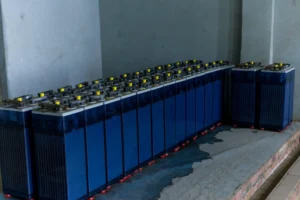
How Do I Maintain The Batteries In My Off-Grid Solar Panel System? Share: Facebook Twitter LinkedIn Pinterest Off-grid solar panel systems have become increasingly popular

How Do I Ensure My Solar Panel System Is Safe And Meets Building Regulations? Share: Facebook Twitter LinkedIn Pinterest As more and more homeowners opt

What Are The Most Common Causes Of Damaged Solar Systems? Share: Facebook Twitter LinkedIn Pinterest Solar energy is becoming an increasingly popular renewable source for
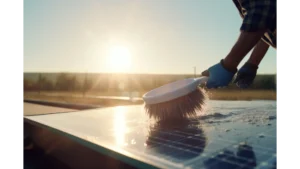
How Do I Maintain And Clean My Solar Panels? Share: Facebook Twitter LinkedIn Pinterest Maintaining and cleaning your solar panels is essential to ensure they
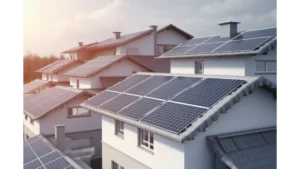
What Warranties Are Available For Residential Solar Panels Share: Facebook Twitter LinkedIn Pinterest Homeowners righfully ask “What Warranties Are Available For Residential Solar Panels ?”
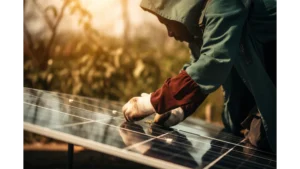
What Kind Of Maintenance Do Solar Panels Require? Share: Facebook Twitter LinkedIn Pinterest As solar energy becomes more popular, more and more people are turning